

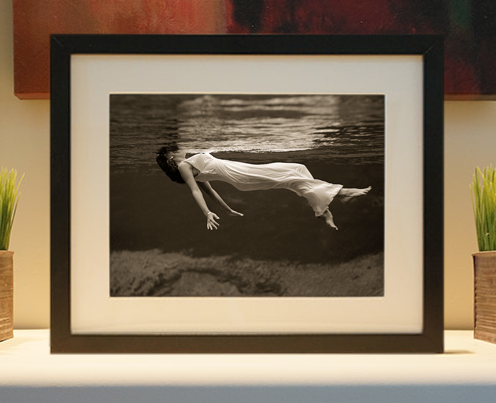
Framed or unframed, desk size to sofa size, printed by us in Arizona and Alabama since 2007. Explore now.
Shorpy is funded by you. Patreon contributors get an ad-free experience.
Learn more.

- Alas, hidden from view
- Exclusive pump
- Details, Details
- What's that building to the left of the tower?
- Coal Barges
- Bromo-Seltzer
- Inner harbor
- The Basin
- What a headache!
- Giant stepladder?
- Baldwin 62303
- Baldwin VO-1000
- Cold
- No expense spared
- Tough Guys
- Lost in Toyland
- And without gloves
- If I were a blindfolded time traveler
- Smoke Consumer Also Cooks
- Oh that stove!
- Possibly still there?
- What?!?
- $100 Reward
- Freeze Frame
- Texas Flyer wanted
- Just a Year Too Soon
- WWII -- Replacing men with women at the railroad crossing.
- Yes, Icing
- You kids drive me nuts!
- NOT An Easy Job
Print Emporium
No Money at All: 1936

August 1936. "Part of an impoverished family of nine on a New Mexico highway. Depression refugees from Iowa. Left Iowa in 1932 because of father's ill health. Father an auto mechanic laborer, painter by trade, tubercular. Family has been on relief in Arizona but refused entry on relief rolls in Iowa to which state they wish to return. Nine children including a sick four-month-old baby. No money at all. About to sell their belongings and trailer for money to buy food. 'We don't want to go where we'll be a nuisance to anybody.'" Medium-format nitrate negative by Dorothea Lange for the Resettlement Administration. View full size.
People who blame poor people for being poor
I always want to look back two or three generations and see how their families did during the Depression.
When I was getting to know my college girlfriend (1989), I asked her what her grandparents' occupations had been. One grandfather was a geologist, and the other was a psychiatrist. I couldn't have been more surprised. After all, in my world, grandparents were truck drivers, farmers, carpenters, loggers. They did what they had to do, and did it proudly. Parents had been fortunate enough to go to college, due either to the GI bill, or the aggregate of New Deal programs that raised the entire country's level of affluence enough that people could afford college. Student loans were reasonable, state schools had subsidized tuition.
"Pulling yourself up by your bootstraps" used to be a tongue-in-cheek expression for doing the impossible. Now it's what you get blamed for not doing if you are down on your luck, and often, I dare say, with a tinge of racism. Always denied, of course.
Every time I hear some young buck opine that today's poor should solve their own problems, I wonder if, oblivious to his own privilege, he is unwittingly insulting his own grandparents.
There Was No Birth Control
Women had babies because they didn't know how to prevent them -- except to not have sex -- and what husband would put up with that! Until the '30s, it was illegal for even a doctor to discuss such things. Birth control is just one other thing we take for granted these days. Still, it's not always available to the very poor.
[There certainly was birth control. Condoms were widely available in the 1930s. - Dave]
Striking
This is a very striking picture. From an aesthetic point of view, I'm really taken by the huge contrast between the dire situation the young mother is facing, and the innocence and cheerful looks on the kids' faces. I know this might be a cliche, but this picture shows the truth on that saying, that the real wealth in life is not in material things but in the blessing of our loved ones. In spite of all their hardships, this looks to me like a closely-knit family, with the parents pulling together not for themselves, but for their kids. Definitely some people I'd be very glad, and honored, to meet.
To me the kids look blissfully unaware of the difficulties faced by their family; speaks volumes for the will of their parents to carry on and get them through. I mean, just look at the faces of the kids in many other Shorpy photos. There's a huge difference between these smiling, happy lads and the "little grown-ups" working in the mills or the factories. Similar circumstances, but different ways to face them?
Hats off to that hardy spirit, it is one of the main factors that make a country great. I really wish we could find out if they made it safely out of the depression; in my heart I really hope they did.
Too much generalization
There's too much generalization going on here. There are plenty of poor people today who don't want handouts and don't want to be a strain on the system. Also, it's almost not possible to have a house and a family without having loans to pay off these days. I don't think debt is a bad thing if you can handle it.
You can't directly compare now to then, because the world is a lot different. It should be enough to just say that this is a sad situation, and our hearts go out to these people. I wonder how selling everything will help them in the long run. Just sad.
Why, why, why
Did this couple continue to bring children into the existence they were enduring--and the husband being tubercular? The photo caption states in one place that they were a family of nine, and in another place that there were nine children. Either way, that makes for a lot of mouths to feed. I know what causes babies, and the couple could at least have shown some responsibility along those lines.
A Nightmare
Really, this is a total nightmare. Just imagine travelling in the desert heat with the dust and the sand getting into everthing, your clothes, your hair. Most likely you have no opportunity to wash yourself properly, maybe you have no soap and the water you have is for cooking only. (If you have something to cook) You get smelly and you clothes become soiled and stink. You have bugs and parasites all over the place and probably in the mattresses and sheets too. And probably worst of all: no toilet paper. It's a total nightmare. Most of us probably can't even imagine how it would be be if you can't give your children something to eat and you may have to steal to get them some food.
Maybe these people are a bit lucky not to be Black Americans because for them it was probably even worse than for White Americans in the Depression.
And I was feeling sorry for myself
Until I saw this picture and all because my 2nd computer needs a new hard drive. I have no idea of real hardship. Thanks for the wake up call.
No money
The Depression years were tough. My father died from TB in 1929 and left my mother with 10 children. It was the support that my older sisters gave to the family that saved us. They gave every penny they earned (one worked for Ford Motor Co., one at a dime store) to my mother.
Food -- at supper I would say to my mother All I can have please. To this day I do not waste food.
Money -- To this day I check to see if I have the money before I pump the gas.
We were blessed. gain it would be nice to know how these two families did in the years since 1936.
For Pete's Sake
Lucy, having no health insurance is not the same as having no health care. This family today would be covered by the Medicaid and SHCIP, programs, etc., that we are already paying for. If this family could be transported to today I think they would have a hard time understanding why we think our health system is in crisis.
And I'll be the first to sign up if you can actually provide medicine for free.
iPhone
I had a patient at work that couldn't pay her hospital bill and was applying for public assistance.... but she had an iPhone! You wouldn't EVER catch anyone these days selling belongings to get something that the govn't will hand over for free. And things that are free have no value.
During the Depression
My father's mother died in 1931 leaving him age 10, and a brother age 4 with the father, an unskilled immigrant. The father with a temper could not hold employment, and moved the 2 children 15 hours to an inhospitable climate, and away from his deceased wife's huge extended family.
Once there, he abandoned the children to fend for themselves. In the later years of his life my father told me this story and how he managed to keep himself and his little brother clothed and fed. He did whatever he had to including stealing food scraps from trash bins behind restraunts. He did not steal from other unfortunate people and no one gave him a hand-up. From time to time the old man would come back and take his frustration out on my father's back.
Both my father and his brother survived to adulthood, neither graduating high school. Both boys joined the military as soon as they could. They both came back to the small survival town, married, and raised children.
My father's father never did get his shit together. He raised a brood of children in squalor and it was always someone else's fault, and he injured several of them.
Neither my father nor his brother ever had a credit card, or a checking account. They did not buy a vehicle until they had the cash and could afford the upkeep. They both bought homes they could afford, paid for them and improved them when they had cash. My uncle learned a skilled trade and was successful until the day he died in his 40s when an old man had a heart attack and hit his vehicle head on. My father died at 80 with a sizeable estate.
This is how people survived. They did what they had to do, expecting nothing from noone and raised their children to do the same. None of the surviving childen of my father and his brother have ever been on the system in any way. None of us have debt. Our children, however, are a different story.
The very essence of POOR
You can't get any more rock bottom than this. If these folks survived the Depression it left a mark that would never go away.
I remember a friend telling me about his father, wandering the streets of San Antonio in 1935. He stopped in front of an Army recruiting office, reached into his pocket, and all the money he had--all the money in the world--was one dime. Figuring the Army couldn't be any worse, he went in and joined up, serving one year and then getting recalled during WW2.
From that time on, he always carried a dime in his pocket to remind himself that no matter how bad things got, things would never be as bad as 1935. How's that for a lasting impression?
Most poor folks are proud.
Most poor folks are proud. It's all some of them do have. Coming from western Oklahoma and knowing those people as my aunts and uncles and elders all I can say is these people may have had nothing, but they were flinty and determined. And they wanted to improve themselves. That attitude still lives all over this country.
The poor (my poor anyway) don't want to be a nuisance to anyone; they just want a chance to work and improve their lives.
There but for the grace of God....
Thank God for modern "miracle drugs" that are used nowadays to treat TB!
You notice that the family is sticking together AND that the couple is married! A far cry from today's "single" and unwed mothers....Not to mention irresponsible fathers...who use the female and then refuse to take responsibility for their own behavior..and it's consequences!
Back then, if a person-fammily went on "relief" they were expected to pay the money back. That's probably one of the reasons (and shame) why they didn't want to seek help in Iowa. Truthfully, there wasn't much help to receive because the county-state resources were overstretched with the huge numbers of people who's farms had been destroyed by the drought and winds.
I hope that things eventually worked out for this family. The children are adorable!
No Money At All: 1936
I believe that those who are not poor demand much more of poor people than poor people demand of them.
"What happened?"
These people are the same sorts of people who a few years later sucked it up and fought World War II or stayed at home working long hours in the factories and farm fields. They stuck with it, banded together, worked hard, sweated, sacrificed, and most lived their lives without any unnecessary government handouts because indeed "We don't want to go where we'll be a nuisance to anybody." I know this because my parents were people like that. My mom and her family came out to California in 1932 in a Ford Model T with a mattress on the top and the boys taking turns riding on the running boards. My dad's family was even poorer. They picked cotton, planted fields, worked in packing sheds, and wound up living the "American dream" because they would not let circumstances keep them down. They lived long and productive lives and made it into the middle class but they never forgot the poverty either.
Proud?
I have heard more privileged people alleging that poor people say "where is my free...?" than I have heard poor people actually saying it.
Tough as nails
Does that attitude still exist in America at all anymore?
The Real Depression
Driving down I-93 from New Hampshire to Boston last Saturday morning, seeing the endless waves of northbound SUV's, RV's, boat trailers, and other shiny, generally very new vehicles headingup country for a week or two of summer vacation, I couldn't help but think, "What recession?" I know these have been hard times on a lot of people, but there are few (if any) scenes in America today similar to what is depicted in this photograph. And few (if any) contemporary Americans, with their cell phones and their flat screen TV's and their home PC's and their 3 or 4 nights a week eating out and their well-stocked mega-grocery stores and their air-conditioning, etc., etc., who have ANY IDEA what the people in the 1930's endured when we had a "real" depression.
Some of these images are just hard to look at.
I mean, what happened to these people? You see hundreds of pictures of them looking like they need immediate help, but did they always get it. Are there untold stories of entire families dying trying to drive out of the dust bowl? This family pictured here sure look like candidates.
Impoverished families 2009
We can moderize this story of an impoverished family: Father an auto mechanic, painter by trade, tubercular, no health insurance and the parents of a very sick four-month old baby also have no health insurance. The last thing they need is free socialized medicine!
If I had a time machine...
The first thing I'd love to do is jump back into these Depression era photos and start handing out all the cash I could spare. Especially when I read things like that young mother's attitude that they didn't want to be a nuisance to anyone. But first I'd make sure that time machine could get me back. I may be sympathetic, but I'm also spoiled rotten with all we have these days.





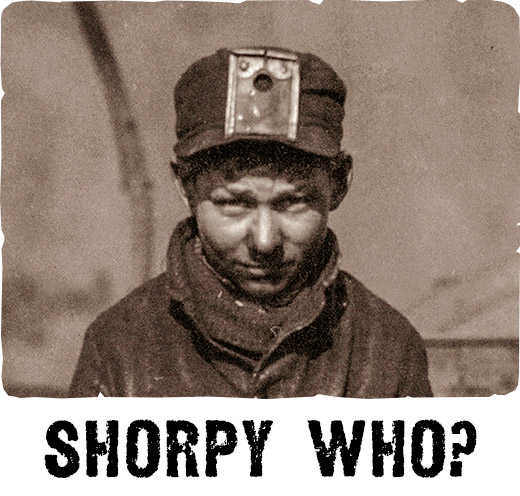
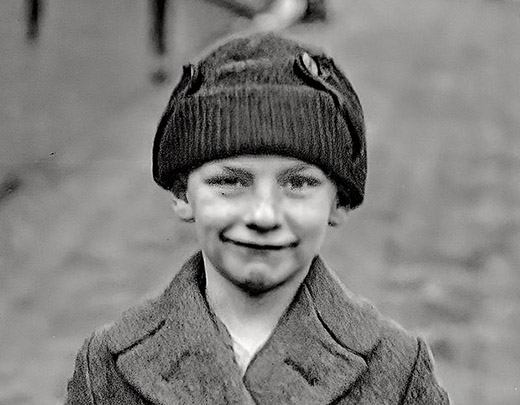
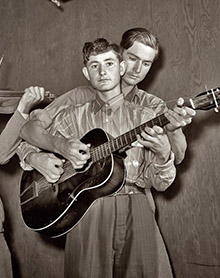
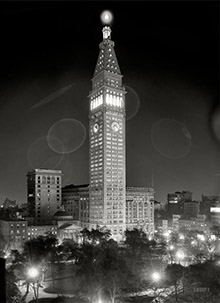
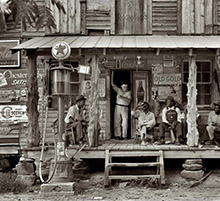
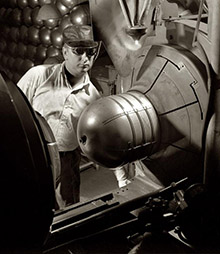
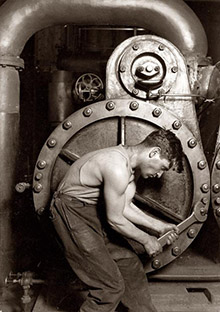

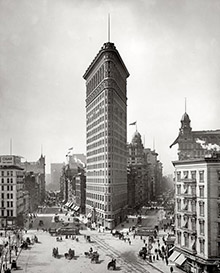



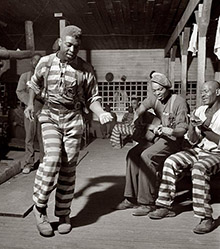

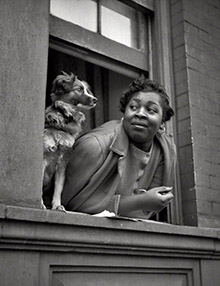

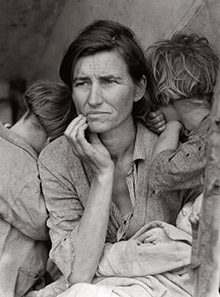

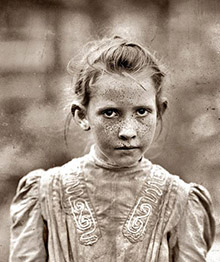
On Shorpy:
Today’s Top 5